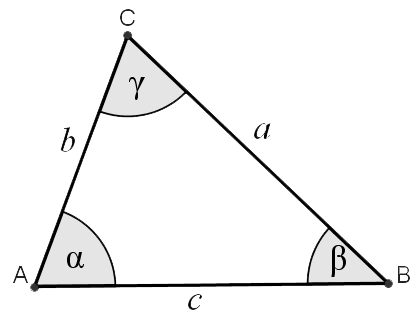Triangle calculator
You have entered height ha, height hb, and height hc.Right scalene Pythagorean triangle.
Sides: a = 165 b = 220 c = 275Area: T = 18150
Perimeter: p = 660
Semiperimeter: s = 330
Angle ∠ A = α = 36.87698976458° = 36°52'12″ = 0.64435011088 rad
Angle ∠ B = β = 53.13301023542° = 53°7'48″ = 0.9277295218 rad
Angle ∠ C = γ = 90° = 1.57107963268 rad
Height: ha = 220
Height: hb = 165
Height: hc = 132
Median: ma = 234.96601029962
Median: mb = 198.30553201505
Median: mc = 137.5
Inradius: r = 55
Circumradius: R = 137.5
Vertex coordinates: A[275; 0] B[0; 0] C[99; 132]
Centroid: CG[124.66766666667; 44]
Coordinates of the circumscribed circle: U[137.5; 0]
Coordinates of the inscribed circle: I[110; 55]
Exterior (or external, outer) angles of the triangle:
∠ A' = α' = 143.13301023542° = 143°7'48″ = 0.64435011088 rad
∠ B' = β' = 126.87698976458° = 126°52'12″ = 0.9277295218 rad
∠ C' = γ' = 90° = 1.57107963268 rad
Calculate another triangle
How did we calculate this triangle?
The calculation of the triangle has two phases. The first phase calculates all three sides of the triangle from the input parameters. The first phase is different for the different triangles query entered. The second phase calculates other triangle characteristics, such as angles, area, perimeter, heights, the center of gravity, circle radii, etc. Some input data also results in two to three correct triangle solutions (e.g., if the specified triangle area and two sides - typically resulting in both acute and obtuse) triangle).1. Input data entered: height ha, height hb, and height hc.
ha=220 hb=165 hc=132
2. From the height ha, height hb, and height hc, we calculate area T:
h=2ha1+hb1+hc1=(1/220+1/165+1/132)/2=0.009 S1=4⋅ h⋅ (h−1/ha)⋅ (h−1/hb)⋅ (h−1/hc) S1=4⋅ 0.009⋅ (0.009−1/220)⋅ (0.009−1/165)⋅ (0.009−1/132)=5.51⋅10−5 T=S11=5.51⋅10−51=18150
3. From the area T and height ha, we calculate side a:
T=2aha a=ha2 T=2202⋅ 18150=165
4. From the area T and height hb, we calculate side b:
T=2bhb b=hb2 T=1652⋅ 18150=220
5. From the area T and height hc, we calculate side c:
T=2chc c=hc2 T=1322⋅ 18150=275
We know the lengths of all three sides of the triangle, so the triangle is uniquely specified. Next, we calculate another of its characteristics - the same procedure for calculating the triangle from the known three sides SSS.
a=165 b=220 c=275
6. The triangle perimeter is the sum of the lengths of its three sides
p=a+b+c=165+220+275=660
7. Semiperimeter of the triangle
The semiperimeter of the triangle is half its perimeter. The semiperimeter frequently appears in formulas for triangles to be given a separate name. By the triangle inequality, the longest side length of a triangle is less than the semiperimeter.s=2p=2660=330
8. The triangle area using Heron's formula
Heron's formula gives the area of a triangle when the length of all three sides is known. There is no need to calculate angles or other distances in the triangle first. Heron's formula works equally well in all cases and types of triangles.T=s(s−a)(s−b)(s−c) T=330(330−165)(330−220)(330−275) T=329422500=18150
9. Calculate the heights of the triangle from its area.
There are many ways to find the height of the triangle. The easiest way is from the area and base length. The triangle area is half of the product of the base's length and height. Every side of the triangle can be a base; there are three bases and three heights (altitudes). Triangle height is the perpendicular line segment from a vertex to a line containing the base.T=2aha ha=a2 T=1652⋅ 18150=220 hb=b2 T=2202⋅ 18150=165 hc=c2 T=2752⋅ 18150=132
10. Calculation of the inner angles of the triangle using a Law of Cosines
The Law of Cosines is useful for finding a triangle's angles when we know all three sides. The cosine rule, also known as the Law of Cosines, relates all three sides of a triangle with an angle of a triangle. The Law of Cosines extrapolates the Pythagorean theorem for any triangle. Pythagorean theorem works only in a right triangle. Pythagorean theorem is a special case of the Law of Cosines and can be derived from it because the cosine of 90° is 0. It is best to find the angle opposite the longest side first. With the Law of Cosines, there is also no problem with obtuse angles as with the Law of Sines because the cosine function is negative for obtuse angles, zero for right, and positive for acute angles. We also use an inverse cosine called arccosine to determine the angle from the cosine value.a2=b2+c2−2bccosα α=arccos(2bcb2+c2−a2)=arccos(2⋅ 220⋅ 2752202+2752−1652)=36°52′12" b2=a2+c2−2accosβ β=arccos(2aca2+c2−b2)=arccos(2⋅ 165⋅ 2751652+2752−2202)=53°7′48" γ=180°−α−β=180°−36°52′12"−53°7′48"=90°
11. Inradius
An incircle of a triangle is a tangent circle to each side. An incircle center is called an incenter and has a radius named inradius. All triangles have an incenter, and it always lies inside the triangle. The incenter is the intersection of the three-angle bisectors. The product of a triangle's inradius and semiperimeter (half the perimeter) is its area.T=rs r=sT=33018150=55
12. Circumradius
The circumcircle of a triangle is a circle that passes through all of the triangle's vertices, and the circumradius of a triangle is the radius of the triangle's circumcircle. The circumcenter (center of the circumcircle) is the point where the perpendicular bisectors of a triangle intersect.R=4 rsabc=4⋅ 55⋅ 330165⋅ 220⋅ 275=137.5
13. Calculation of medians
A median of a triangle is a line segment joining a vertex to the opposite side's midpoint. Every triangle has three medians, and they all intersect each other at the triangle's centroid. The centroid divides each median into parts in the ratio of 2:1, with the centroid being twice as close to the midpoint of a side as it is to the opposite vertex. We use Apollonius's theorem to calculate a median's length from its side's lengths.ma=22b2+2c2−a2=22⋅ 2202+2⋅ 2752−1652=234.96 mb=22c2+2a2−b2=22⋅ 2752+2⋅ 1652−2202=198.305 mc=22a2+2b2−c2=22⋅ 1652+2⋅ 2202−2752=137.5
Calculate another triangle
Look also at our friend's collection of math problems and questions:
- triangle
- right triangle
- Heron's formula
- The Law of Sines
- The Law of Cosines
- Pythagorean theorem
- triangle inequality
- similarity of triangles
- The right triangle altitude theorem

